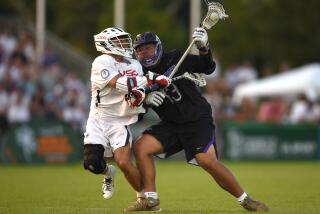USA Boxing may not have a fighting chance till 2020
— It wasn’t all that long ago that U.S. amateur boxers ruled the world.
Going into the London Games, the U.S. had won 108 Olympic medals in the sport, 45 more than Cuba, the next-closest nation. And never had it come home from a Games without at least one medal.
But that world has changed.
The U.S. men’s team of nine boxers in these Olympics combined to win just five bouts, no medals and qualified only one boxer, welterweight Errol Spence, for the quarterfinals — and he got there only after an appeals panel overturned a loss in the ring.
It was a failure of historic proportions. And, says head coach Basheer Abdullah, if the U.S. can no longer beat the opposition, perhaps it should try copying them.
“We’ve got to look at other countries and see what they’re doing,” he said. “The rest of the world has caught up to us. So we’ve got to make some changes.”
The U.S. did take big strides in London by dominating the inaugural women’s tournament, with middleweight Claressa Shields winning gold and flyweight Marlen Esparza earning a bronze. Russia and China were the only other countries to win as many as two medals, but neither of theirs was gold.
Now it’s time to start the long process of making the men’s program competitive again, says Anthony Bartkowski, USA Boxing’s executive director.
“We definitely have some work to do,” he said. “We’re going to go back home, regroup, debrief and try to construct a road map for Rio in four years. It’s going to be very labor-intensive.”
Bartkowski was hired less than two years ago to rebuild a program that had gone through seven chief executives in six years, run up a record debt of $1.7 million and was coming off a USOC-imposed probation levied because of questions about its governance structure. As a result, the organization has had little recent direction or consistency — which is why Bartkowski believes the U.S. may not challenge for dominance in Olympic boxing again until 2020.
And even that may not be enough time, suggested veteran pro boxing promoter Bob Arum.
“It’s totally disorganized, and that’s how our kids looked — disorganized, lost,” Arum said of the team’s London performance.
And that’s costing the program good fighters, Arum insisted, pointing to the examples of 20-year-old fighters Jesse Magdaleno and Jose Benavidez, who are a combed 27-0 with 21 knockouts as pros.
“We at first told these kids to leave our office and go enjoy the Olympic experience,” Arum said. “But they refused. They said the Olympic structure was such a racket, so disorganized and convoluted that they were going to turn pro with or without me.”
Charles Leverette, an assistant coach who worked the corner in London, agrees that USA Boxing has an image problem .
“We’ve got to get a little more stability in the organization,” he said. “We’ve got to be more organized. We’ve got to get that structure back together.”
But although Arum believes stability means allowing fighters to stay home and train with their personal coaches, Abdullah and Leverette are pushing hard for the kind of long-term residency program other countries use, one in which all the boxers train in a central location under control of the national team coaches.
Even that wouldn’t be a panacea for USA Boxing. But it would be a start.
“We’ve got to take back control of our program,” said Abdullah, who was hired on an interim basis in June and will be out of a job when the U.S. team returns home this week.
“I believe that things are going to get better. But right now we’re at a very, very low [stage]. Our board, our executive director and everybody that has a say-so in changing this program will really have to put policies and standards in place and make our program one of the elite programs in the world.”
A world it once ruled.
Lance Pugmire reported from Los Angeles.
More to Read
Go beyond the scoreboard
Get the latest on L.A.'s teams in the daily Sports Report newsletter.
You may occasionally receive promotional content from the Los Angeles Times.








